MirCorp was created by visionaries who understood that the time had arrived when the private sector was able to run manned space operations. And that the planned International Space Station, with its huge costs, and dependency on the NASA space shuttle, was the wrong path to take.
The original investor was Walt Anderson and co-investor Dr. Cherinjeev Kathuria. The idea grew out of the Rick Tumlinson’s Save the Mir campaign.
The management included as Chief Executive Officer, Jeffrey Manber, Vice-President of Development, Andrew Eddy. CFO was Dr. Kathuria. Working directly alongside Mr. Manber was the RSC Energia Office of International and Business Development, lead by Alexander Derechin and his staff.
Mission Accomplishments Include:
- first commercial lease agreement for orbiting manned space station (December, 1999, signed officially in February of 2000)
- first privately funded manned expedition to a space station (launch April 4, 2000, return 16 June, 2000)
- first privately funded cargo resupply mission in space (April 27, 2000)
- first privately funded spacewalk (May 12, 2000)
- first contract for space tourist (Dennis Tito, June 19, 2000)
The 73 day MirCorp mission, which sent Cosmonauts’ Sergei Zalyotin and Alexander Kalery, began with the drama of the hatch being carefully opened on April 6th, 2000. They became the first crew members to board Mir since 1999.
The mission accomplished several critical accomplishments.
On a technical level, it showed how robust was the space station Mir platform; being able to bring it back to life after so many months of inactivity. It taught the space officials much about how to overcome unexpected events during a long space mission. The “infamous” leak was located and repaired.
In terms of business development it proved several points. For one, that a private company that had access to space could work directly with major media and Hollywood outfits. Significant agreements were reached with NBC, Mark Burnett, and several leading entertainment houses which wished to remain anonymous.
And, of course, that if given the opportunity men and women will pay to journey into space.
Equally critical was the proof that given some imagination a lower cost path could, can and will be found to safely explore the solar system. Government contracting may not always be the most productive means for space exploration.
|

